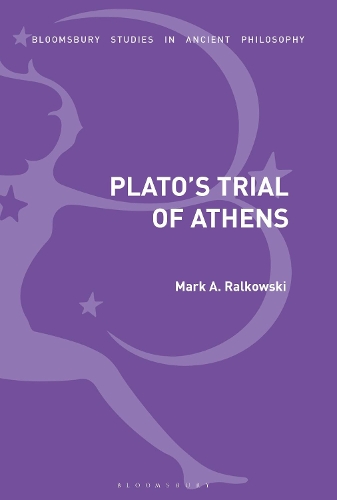
Platos Trial of Athens
(Paperback)
Available Formats
Publishing Details
Platos Trial of Athens
By (Author) Dr Mark A. Ralkowski
Bloomsbury Publishing PLC
Bloomsbury Academic
28th May 2020
United Kingdom
Classifications
Tertiary Education
Non Fiction
Ethics and moral philosophy
Ancient history
184
Physical Properties
Paperback
248
Width 154mm, Height 232mm, Spine 14mm
380g
Description
What can we learn about the trial of Socrates from Platos dialogues Most scholars say we can learn a lot from the Apology, but not from the rest. Platos Trial of Athens rejects this assumption and argues that Plato used several of his dialogues to turn the tables on Socrates accusers: they blamed Socrates for something the city had done to itself. Plato wanted to set the record straight and save his city from repeating her worst mistakes of the 5th century. Platos Trial of Athens addresses challenging questions about the historicity of Platos dialogues, and it traces Platos critique of Athenian public life and polis culture from the trial in 399 up through the Laws and the Atlantis myth in the Critias and Timaeus. In the end, Ralkowski shows that what began as a bitter response to the unjust, politically-charged trial of Socrates, evolved into a pessimistic reflection on the role of philosophy in a democratic society, a theory about Athens 5th century decline, and cautionary tale about the corrupting influences of naval imperialism.
Reviews
A fine book with a straightforward, persuasive thesis ... Compelling and thought-provoking. * Exemplaria Classica *
In this excellent book Mark Ralkowski sheds new light on the trial of Socrates by placing it in the context of Platos lifelong opposition to Athenian democracy. He argues that the city and not Socrates corrupted the youth of Athens, and in particular Alcibiades. The book is well-written, the thesis is bold but the argument is judicious, the scholarship is thorough and the treatment of Alcibiades in particular will advance the discussion of that flamboyant and controversial Athenian personality. This should be essential reading for everyone interested in Socrates and his trial, Plato political philosophy, and ancient Athens. * William J. Prior, Professor Emeritus, Santa Clara University, USA *
Ralkowski packs a lot into this book. Above all, he sets the political interpretation of Socrates trial on a secure foundation, especially by paying fruitful attention to dialogues other than Apology itself. But he also shows how Plato turned the tables on the Athenian people by charging them, not Socrates, with being the source of corruption, and exposes Platos pessimistic belief that the reformation of society by philosophers, which was Socrates mission, was doomed to failure. Vigorous, intelligent, thorough, this is a book that anyone interested in Socrates will want to read. * Robin Waterfield, author of Why Socrates Died: Dispelling the Myths *
Platos Trial of Athens offers the reader a fresh rethinking of Socrates life and death. Ralkowski demonstrates that the full implications of Platos representation of his trial can only be understood from within the counter-frames of the Symposium, Gorgias, Republic, Alcibiades I, and Timaeus, which judge and condemn Athens corrupt values. Arising from the ashes of Athens defeat and Socrates death, the Socratic way of life, the author shows, is presented by Plato as the only path to both spiritual and political regeneration. This original studys comprehensive perspective illuminates facets of Platos thought that too often are treated piecemeal. * John Bussanich, Professor of Philosophy, University of New Mexico, USA *
R.s book is a substantial contribution to classical studies. It is written in a friendly and captivating style that allows readers who are not aware of philological discussions to enter into a topic that marked the destiny of the Western tradition, and it reserves for the scholar a good number of well-constructed arguments as well as original and creative ideas on numerous passages of the Platonic corpus. In the vast literature on Socrates, this work will surely earn its rightful place. * The Classical Association *
Author Bio
Mark A. Ralkowski is Assistant Professor of Philosophy and Honors at the George Washington University, USA
